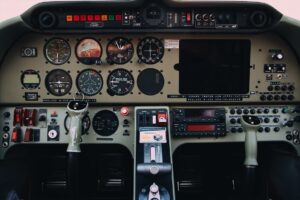General Radio Operator License (GROL): The Essentials
Electronically integrated mechanical components have become essential in today’s aircraft. As a result, familiarity with fundamental electronic and electrical concepts is a wise investment. So, here is everything you need to know about obtaining your General Radio Operator License (GROL).

A Brief History
The Department of Commerce, under the power of the Radio Act of 1927, is credited with issuing the first commercial operator licenses. Subsequently, the Federal Radio Commission was responsible for administering these licenses in 1934.
First and Second Class Radiotelephone Operator Licenses got awarded by the Commission. Then, the Commission added Third Class permission in 1953.
The “First Phone,” as they came to be known, was a requirement for chief engineers at broadcast stations and those working on television transmitters following World War II. The “Second Phone” was a common tool for radio transmitter repairmen. Finally, announcers who were required to report meter readings or operate a low-power radio broadcast station were required to have a Third Class permit.
The GROL examinations of today focus on the regulations governing broadcasting by the FCC and communications technology. A license is no longer legally required to work at a broadcast station, except in some unique cases.
What the License Does
As a license given by the FCC, the General Radiotelephone Operator License (GROL) authorizes the holder to operate, maintain, or install certain types of licensed radio and television transmitters in the United States including:
- Operating, repairing, or maintaining a maritime land radio station
- A radio station on a ship that gets compulsorily equipped with more than 1500 watts of the peak envelope power
- A radio station on a ship voluntarily equipped with more than 1000 watts of the peak envelope power.
- An aeronautical, including an aircraft, station with more than 1500 watts of peak envelope power requires a GROL from the FCC
Who Needs a GROL
Specified ship and aircraft radio communication stations require a general radio operator license to operate and maintain.
Antennas, radar and weather equipment, electrical sensors and communications equipment, lighting inside and out, and navigation systems are avionic professionals’ jobs. In addition to removing and replacing, these professionals will also troubleshoot and test the components.
Not only avionics specialists maintain and repair these parts. Those with an Airframe and Powerplant certificate can also undertake basic electrical and troubleshooting work. A&P techs rarely do avionics work, but a GROL licensee signs off on it.
The Importance of GROL
When repairing modern-day aircraft transponders, radars, and radios, the FCC GROL is required. This qualification allows you to supervise technicians working on radar equipment who do not have the necessary credentials, allowing more workforce to work on various tasks.
Moreover, having a GROL increases the chances of landing specialized, higher-paying jobs.
Conclusion
Mechanical and electronic components are increasingly incorporated in today’s aircraft, making them more advanced.
To better understand the material, you must take an introductory course in electrical and electronic expertise. In this regard, GROL is an excellent choice for aviation technicians.


